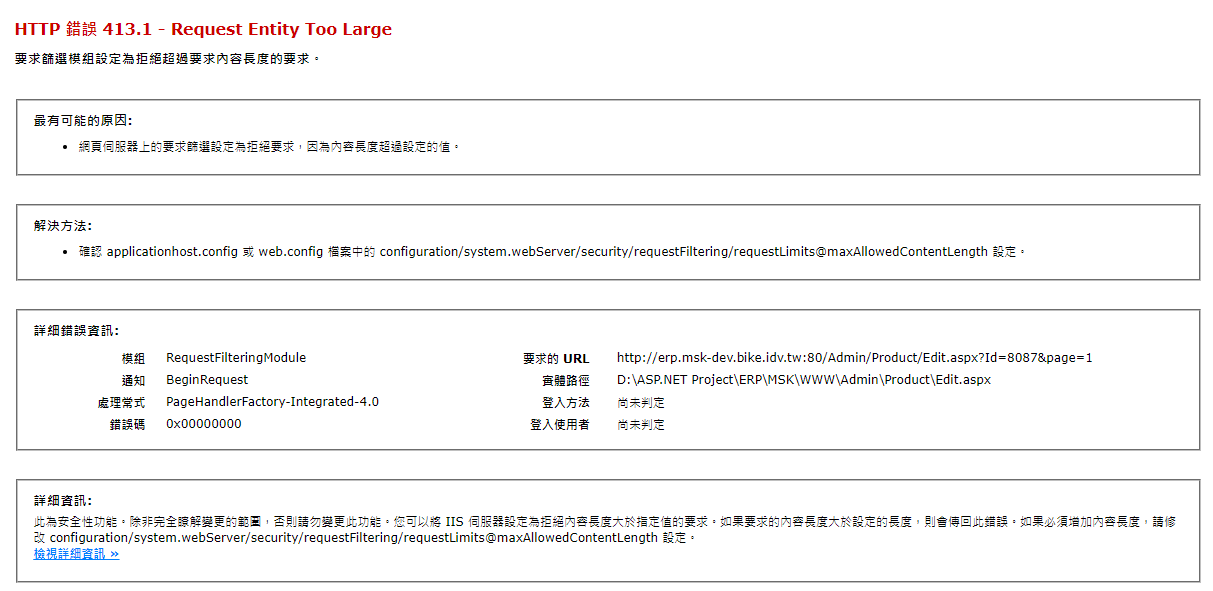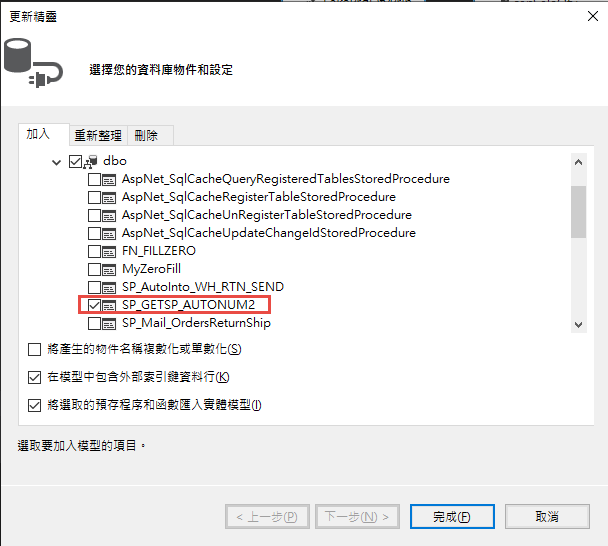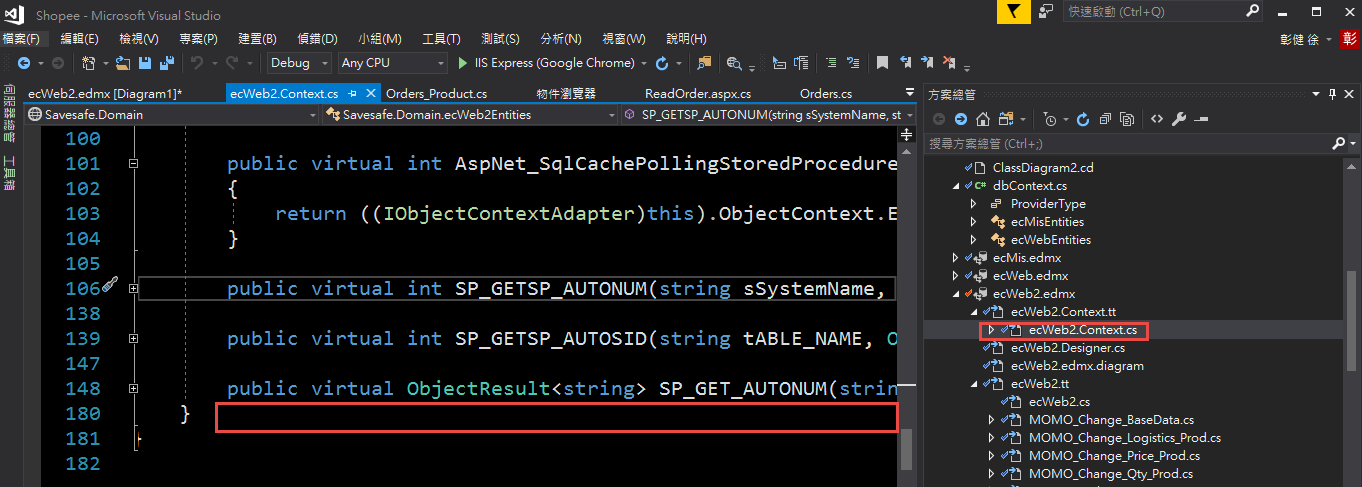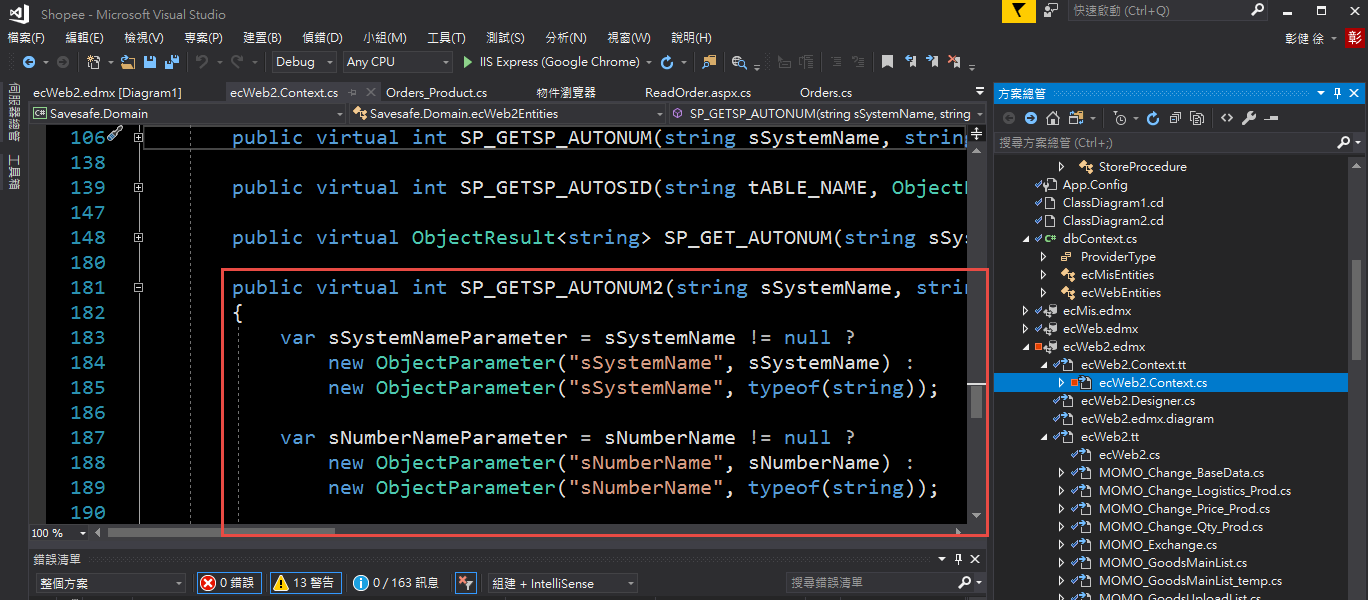
httpRuntime 加 maxRequestLength 沒作用, 請到 system.webServer 設定 maxAllowedContentLength
<system.webServer>
...
<security>
<requestFiltering>
<!--1073741824 ==> 1GB-->
<requestLimits maxAllowedContentLength="1073741824" />
</requestFiltering>
</security>
...
</system.webServer>
1. 從資料庫更新模型

2. 選擇要匯入的 Store Procedure

3. 完成匯入匯入後, function 並不會生出來.

4. Compile 之後, 才會看到這個 function.

CREATE TABLE #Command
(
Id int NOT NULL IDENTITY (1, 1),
command nvarchar(MAX) NOT NULL
) ON [PRIMARY]
TEXTIMAGE_ON [PRIMARY]
GO
USE database_name -- Use the database from which you want to extract the permissions
GO
SET NOCOUNT ON
DECLARE @OldUser sysname, @NewUser sysname
SET @OldUser = 'userOLD' --The user or role from which to copy the permissions from
SET @NewUser = 'userNEW' --The user or role to which to copy the permissions to
insert into #Command(command)
Select convert(nvarchar(max), '--Database Context')
insert into #Command(command)
SELECT 'USE' + SPACE(1) + QUOTENAME(DB_NAME())
insert into #Command(command)
SELECT '--Cloning permissions from' + SPACE(1) + QUOTENAME(@OldUser) + SPACE(1) + 'to' + SPACE(1) + QUOTENAME(@NewUser)
insert into #Command(command)
SELECT 'EXEC sp_addrolemember @rolename ='
+ SPACE(1) + QUOTENAME(USER_NAME(rm.role_principal_id), '''') + ', @membername =' + SPACE(1) + QUOTENAME(@NewUser, '''') AS '--Role Memberships'
FROM sys.database_role_members AS rm
WHERE USER_NAME(rm.member_principal_id) = @OldUser
ORDER BY rm.role_principal_id ASC
insert into #Command(command)
SELECT CASE WHEN perm.state <> 'W' THEN perm.state_desc ELSE 'GRANT' END
+ SPACE(1) + perm.permission_name + SPACE(1) + 'ON ' + QUOTENAME(USER_NAME(obj.schema_id)) + '.' + QUOTENAME(obj.name)
+ CASE WHEN cl.column_id IS NULL THEN SPACE(0) ELSE '(' + QUOTENAME(cl.name) + ')' END
+ SPACE(1) + 'TO' + SPACE(1) + QUOTENAME(@NewUser) COLLATE database_default
+ CASE WHEN perm.state <> 'W' THEN SPACE(0) ELSE SPACE(1) + 'WITH GRANT OPTION' END AS '--Object Level Permissions'
FROM sys.database_permissions AS perm
INNER JOIN
sys.objects AS obj
ON perm.major_id = obj.[object_id]
INNER JOIN
sys.database_principals AS usr
ON perm.grantee_principal_id = usr.principal_id
LEFT JOIN
sys.columns AS cl
ON cl.column_id = perm.minor_id AND cl.[object_id] = perm.major_id
WHERE usr.name = @OldUser
ORDER BY perm.permission_name ASC, perm.state_desc ASC
insert into #Command(command)
SELECT CASE WHEN perm.state <> 'W' THEN perm.state_desc ELSE 'GRANT' END
+ SPACE(1) + perm.permission_name + SPACE(1)
+ SPACE(1) + 'TO' + SPACE(1) + QUOTENAME(@NewUser) COLLATE database_default
+ CASE WHEN perm.state <> 'W' THEN SPACE(0) ELSE SPACE(1) + 'WITH GRANT OPTION' END AS '--Database Level Permissions'
FROM sys.database_permissions AS perm
INNER JOIN
sys.database_principals AS usr
ON perm.grantee_principal_id = usr.principal_id
WHERE usr.name = @OldUser
AND perm.major_id = 0
ORDER BY perm.permission_name ASC, perm.state_desc ASC
Select command from #Command order by Id
drop table #Command
using System.IO;
using iTextSharp.text;
using iTextSharp.text.pdf;
---
string oldFile = Server.MapPath("/Content/PDF/300000419_20160929162658862.pdf"); //"oldFile.pdf";
string newFile = oldFile.Replace(".pdf", "_New11.pdf");
// open the reader
PdfReader reader = new PdfReader(oldFile);
Rectangle size = reader.GetPageSizeWithRotation(1);
Document document = new Document(size);
int NumberOfPages = reader.NumberOfPages;
// open the writer
FileStream fs = new FileStream(newFile, FileMode.Create, FileAccess.Write);
PdfWriter writer = PdfWriter.GetInstance(document, fs);
document.Open();
// the pdf content
PdfContentByte cb = writer.DirectContent;
string text = "Watermark...";
string windir = Environment.GetEnvironmentVariable("windir");
Chunk textAsChunk = new Chunk(text, new Font(BaseFont.CreateFont(windir + "\\Fonts\\mingliu.ttc,0", BaseFont.IDENTITY_H, BaseFont.NOT_EMBEDDED), 20, Font.NORMAL, new BaseColor(255,0,0)));
// create the new page and add it to the pdf
for (int i = 1; i<= NumberOfPages; i++)
{
if(i > 1)
{
document.NewPage();
}
ColumnText.ShowTextAligned(cb, Element.ALIGN_LEFT, new Phrase(textAsChunk), 0, 0, 0);
PdfImportedPage page = writer.GetImportedPage(reader, i);
cb.AddTemplate(page, 0, 0);
}
// close the streams and voilá the file should be changed :)
document.Close();
fs.Close();
writer.Close();
reader.Close();
Response.Write(newFile + "<br>");
Response.Write(NumberOfPages + "<br>");
最常用寫法
INSERT INTO table (name) VALUES('bob');
SELECT SCOPE_IDENTITY()
新發現的寫法
INSERT INTO table (name)
OUTPUT Inserted.ID
VALUES('bob');
在 valuse 前面加上 Inserted.Id
這個有個優點 如果是GUID產生的 Id 也可以取得
HttpApplication Events:
Application_AcquireRequestState
Occurs when ASP.NET acquires the current state (for example, session state) that is associated with the current request.
Application_AuthenticateRequest
Occurs when a security module has established the identity of the user.
Application_AuthorizeRequest
Occurs when a security module has verified user authorization.
Application_BeginRequest
Occurs as the first event in the HTTP pipeline chain of execution when ASP.NET responds to a request.
Application_Disposed
Adds an event handler to listen to the Disposed event on the application.
Application_EndRequest
Occurs as the last event in the HTTP pipeline chain of execution when ASP.NET responds to a request.
Application_Error
Occurs when an unhandled exception is thrown.
Application_PostAcquireRequestState
Occurs when the request state (for example, session state) that is associated with the current request has been obtained.
Application_PostAuthenticateRequest
Occurs when a security module has established the identity of the user.
Application_PostAuthorizeRequest
Occurs when the user for the current request has been authorized.
Application_PostMapRequestHandler
Occurs when ASP.NET has mapped the current request to the appropriate event handler.
Application_PostReleaseRequestState
Occurs when ASP.NET has completed executing all request event handlers and the request state data has been stored.
Application_PostRequestHandlerExecute
Occurs when the ASP.NET event handler (for example, a page or an XML Web service) finishes execution.
Application_PostResolveRequestCache
Occurs when ASP.NET bypasses execution of the current event handler and allows a caching module to serve a request from the cache.
Application_PostUpdateRequestCache
Occurs when ASP.NET completes updating caching modules and storing responses that are used to serve subsequent requests from the cache.
Application_PreRequestHandlerExecute
Occurs just before ASP.NET begins executing an event handler (for example, a page or an XML Web service).
Application_PreSendRequestContent
Occurs just before ASP.NET sends content to the client.
Application_PreSendRequestHeaders
Occurs just before ASP.NET sends HTTP headers to the client.
Application_ReleaseRequestState
Occurs after ASP.NET finishes executing all request event handlers. This event causes state modules to save the current state data.
Application_ResolveRequestCache
Occurs when ASP.NET completes an authorization event to let the caching modules serve requests from the cache, bypassing execution of the event handler (for example, a page or an XML Web service).
Application_UpdateRequestCache
Occurs when ASP.NET finishes executing an event handler in order to let caching modules store responses that will be used to serve subsequent requests from the cache.
Application_Init
This method occurs after _start and is used for initializing code.
Application_Start
As with traditional ASP, used to set up an application environment and only called when the application first starts.
Application_End
Again, like classic ASP, used to clean up variables and memory when an application ends.
Session Events:
Session_Start
As with classic ASP, this event is triggered when any new user accesses the web site.
Session_End
As with classic ASP, this event is triggered when a user's session times out or ends. Note this can be 20 mins (the default session timeout value) after the user actually leaves the site.
Profile Events:
Profile_MigrateAnonymous
Occurs when the anonymous user for a profile logs in.
Passport Events:
PassportAuthentication_OnAuthenticate
Raised during authentication. This is a Global.asax event that must be named PassportAuthentication_OnAuthenticate.
Possibly more events defined in other HttpModules like:
System.Web.Caching.OutputCacheModule
System.Web.SessionState.SessionStateModule
System.Web.Security.WindowsAuthentication
System.Web.Security.FormsAuthenticationModule
System.Web.Security.PassportAuthenticationModule
System.Web.Security.UrlAuthorizationModule
System.Web.Security.FileAuthorizationModule
System.Web.Profile.ProfileModule
無法載入檔案或組件 'FredCK.FCKeditorV2' 或其相依性的其中之一。 存在某個不正常的 API 呼叫。 (發生例外狀況於 HRESULT: 0x800300FA (STG_E_ABNORMALAPIEXIT))
